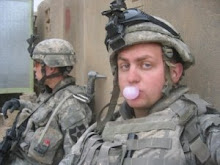The beginning of our work with these
We got a couple of calls one day: one, an Apache laid waste to a carload full of gunmen, and they were all killed. Shortly afterward, the 1920s let us know it was their members that the helicopter killed. The second call was about a mass grave out in the boondocks of the city, in a big field. We had the approximate area, but we had no idea how many bodies were buried under the ground, or why.
We set out from our outpost for quite a walk across town, taking a lot of side streets and avoiding the main ones. On a long stretch, we spotted the car that was destroyed by the Apache helicopter. The passenger door was open, but the bodies were gone. Closer to it, the only thing left of the men in the car was blood and one pair of shoes with the heels shot off. The wall showed the signs of automatic cannon fire, as did the windshield and the seats.

The destroyed car. Note the bullet holes on the wall next to it

If he survived, I'm willing to bet his shoe size is a tad smaller
Walking a little past the car, I noticed a small Motorola radio on the ground. I picked it up,
wanting to hear the chatter on the other side of the radio. I decided it was a bad idea, since
it could have been the trigger for an IED somewhere. I really didn't believe the 1920s stopped
their insurgent operations against us. We often wondered if the "Al Qaeda" members they pointed
out were simply victims of in-house cleaning.
We continued on the road, reaching an intersection with the purported mass grave field. Looking down to the right, I recalled a day when half our platoon was pinned down by dueling enemy machine guns (but that's a story for another Monday). My squad was sent up to a roof overlooking the field where the supposed bodies were to provide cover for the other squads meandering in the open, kicking over rocks and looking under weeds. The hour slowly dripped away as the squads below turned up nothing. We decided to call it a day and headed back to our outpost. Apparently I didn't get the word that was a deep buried IED in the middle of the road on the way back. We halted our movement and Josh said "How many times in your life have you stood on top of an IED?" I looked down at my feet and saw a groove cut into the road with a fresh patch of concrete. I said, "One more." On the way back we passed the car again. A few kids were hanging around the corner, watching us pass by.
The next afternoon we had more reliable information. Not only did we have the exact area, but someone was going to point it out to us. Hoping it wasn't going to be an ambush, we set out again. This time we had a military camera crew with us to take pictures of the scene. Winding through a power station, we entered the large open field from the left side, some of us using a trail, the others stepping on huge dirt clumps and cussing the tall grass. We reached a tiny collection of buildings some distance from the road we were on the previous day. They were simple one-room mud huts. Almost immediately you could smell the decay. We took off our helmets and vests, set our guns down and began digging. Near a wall, a body was quickly found. It was not buried very deep. Bill began to dig deeper and found the skull, split in half from a bullet wound. Though not experts on the matter, we determined she was executed by gunshot at a very close range. Bill tried to lift up the remains, but the skin slid right off the flesh. He had to stop often because the smell was so great, so we traded off.
To the left of the woman we found more bodies, but of two children. The man who pointed out the grave was the husband of the woman, and the father of the two daughters. He explained they were taken 42 days prior and that the dudes had threatened him too. As he told his story, the Iraqi Army soldiers laughed and smoked, watching Americans dig up the bodies of their slain people.
In more rooms, we found more bodies. We were there to merely confirm the graves being there and call in the proper local authorities to recover them. Instead we dug them as we waited, and the Iraqi Army watched on. Payday threw up after awhile. The man, stone-faced and emotionless so far, began to weep as he touched the skull of his wife. The blindfold she was wearing was matted to the skull but began to come off. Into the evening we waited until we got the word to head back for the night. We said goodbye to the man still standing there by the hole, and turned our backs to him as we slowly made our way through the field once again.

A man says his final goodbye to his wife. The Iraqi Army guy takes back the shovel he brought
AH







13 comments:
There's nothing more brutal and ugly than a people making war upon themselves. A terrible story, but one that had to be told to show people that our soldiers have the quality of mercy that sadly seems absent in many hearts in that part of the world.
LOve,
Dad
Great job on "To the Point" today. I really enjoyed your segment.
I don't understand why the IA guy didn't help out.
I wasn't sure what I would find in your blog. After all, I've never read one, especially dealing with the war. I guess I needed to know what my son could experience. He leaves for Iraq in a little over a week. He is 20 years old and the oldest of 3 boys. I am grateful/thankful you made it back to your family and friends. Thank you for telling your story! It is something we all need to hear! An Army Mom
sometimes i think the aftermaths are far worse than the battles themselves. at least, it was that way for me.
i saw some of the mass graves outside hue where folks had been executed for such crimes as being a teacher or wearing eyeglasses. about all we were able to do was toss some quicklime on them and cover them back up.
it sucked out loud.
(my post code is araiban one little letter switch from being totally apropos)
Wow. That was quite a read. War is so very scary. My two sons have never been to war, and I hope that they never have to. I wish we could just bring each and every soldier home.
Theoretically we can and yet no one will.
I love photo story Monday. It keeps me remembering how things really are instead of how we'r supposed to think they are.
It is unfortunate that you were subjected to such rigors, a fact that comes from every war where both the boots on the ground are inexperienced but more so the commanders. You are not the first to be put through this sort of thing nor will you be the last.
I know you do not think well of General Petraus but in fact he is the one who instituted the system in his sector after the invasion of Iraq that worked so well and kept the violence to a minimum, he learned his lessons well from Gen. Macarthur. The practices learned from Viet Nam did not serve us well then nor did they in Iraq. Those mistakes cost us more than was necessary.
Don
Last night while channel hopping I caught a piece of a documentary called war. At the moment they were talking about a young man who was involved with the Pacific campaign and how much difficulty he was having getting over it. His wife spoke about all the different things that he had tried and finally started to write a book about his experiences which helped him more than anything else, I instantly thought of you and what you are trying to do.
The title of the book is "With The Old Breed" by EB Sledge, a brother in arms to you.
I suggest this because I know what you are going through, I dealt with my demons as well.
Don
Blackfive reports today that, "Coalition officials are taking advantage of a decline in insurgent violence to jump-start a transition into long-term stability operations, a U.S. commander said Nov. 11 in Baghdad."
It is impossible to deny the dissimulation, incompetence and negligence emanating, from the outset of this war, from the top of the chain of command on the civilian side.
Yet, if by some series of wholly-unexpected miracles, Iraq somehow attains peace and security sufficient to prevent tyrants and terrorists from planting any more mass graves, perhaps, in the long run, the victory you and your comrades-in-arms will have won will be an encouragement to you, that the sacrifices you made were not in vain.
We won the American Revolution because the British thought it was really unsporting to ambush, to aim at specific individuals, etc. Tables have turned.
Michael Yon's Thanksgiving post reads, in part:
I came across something today that might make veterans of the fighting in Baqubah proud. Back in May, just before operation Arrowhead Ripper, there were about 60 violent acts per day. Now there are about 6. The markets are opening and the streets are again filled with people. I thought the veterans of Baqubah might like to know that their efforts have made a tremendous difference for the people here. You fought hard. This writer saw it. Your sacrifices truly meant something.
-Michael
Thanks to you, and to all who have served, for your valor.
Post a Comment